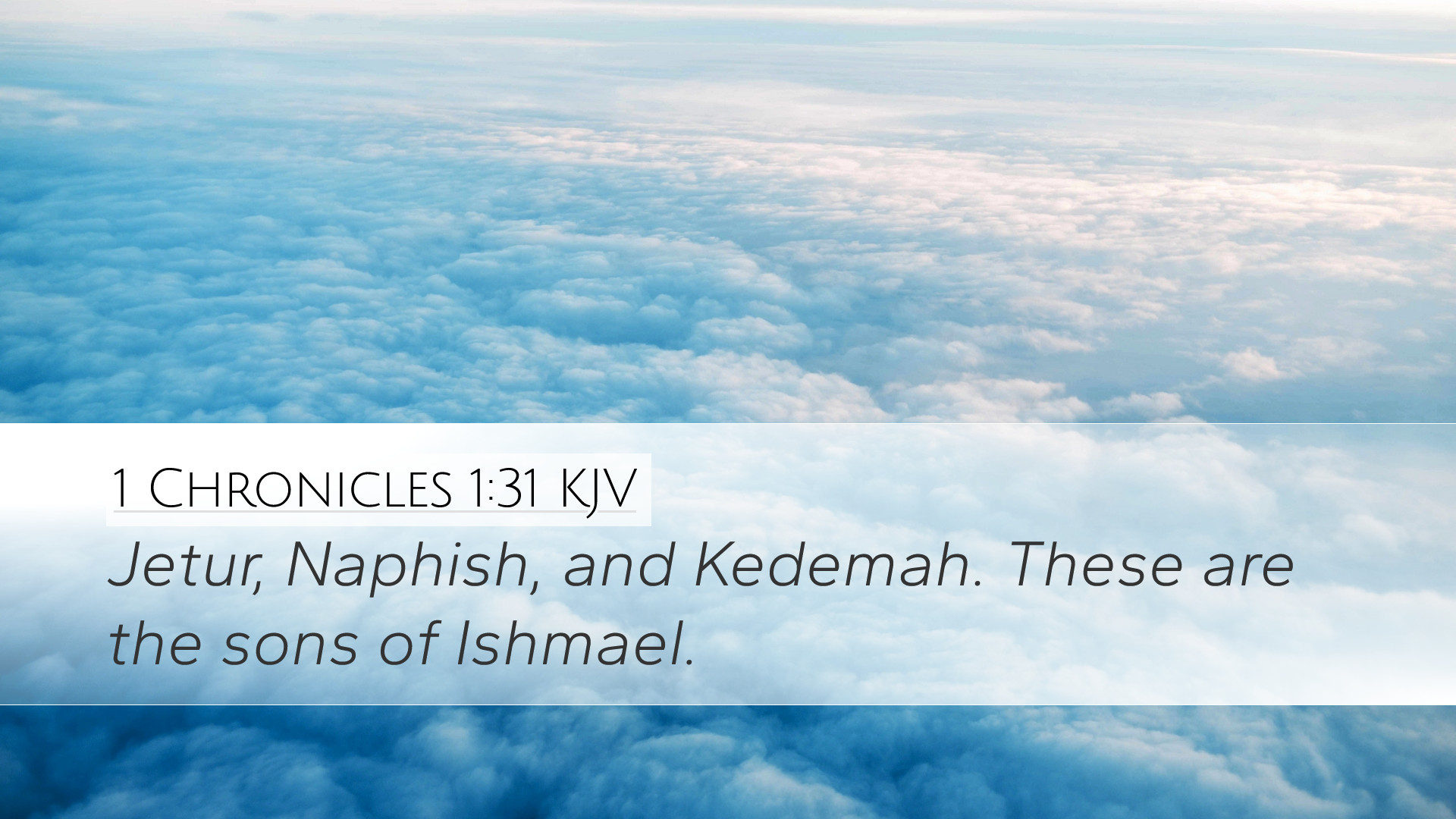Commentary on 1 Chronicles 1:31
Verse Reference: 1 Chronicles 1:31 - "The sons of Abraham: Isaac and Ishmael."
Introductory Overview
1 Chronicles 1 serves as a foundational genealogical narrative, providing
the lineage from Adam to the patriarchs, specifically focusing on Abraham,
Isaac, and Ishmael. This verse, although concise, encapsulates significant
theological insights into the nature of God’s covenant and the unfolding plan
of redemption.
Historical and Cultural Context
In the historical narrative of Israel, genealogies serve both the purpose of
establishing rightful lineage and covenantal significance. Here, the mention of
Isaac and Ishmael reflects a pivotal moment in biblical history—the emergence of
two "nations" from Abraham, whose destinies would play crucial roles in the
divine plan.
Abraham’s Role
- The patriarch Abraham is considered the father of faith in Judeo-Christian
tradition, called out from his homeland to establish a covenantal relationship
with God (Genesis 12:1-3).
- This verse underscores Abraham’s significance in the ancestry of both the
Jewish nation through Isaac and Islamic tradition through Ishmael.
Theological Implications
This passage exemplifies themes of choice, promise, and covenant. Abraham’s
sons, Isaac and Ishmael, indeed represent two distinct paths chosen by God.
The significance of this verse lies in its implications on divine selection and
the unfolding of God's redemptive narrative.
Insights from Matthew Henry
Matthew Henry notes that the simplicity of this statement belies its profound
implications. The births of Isaac and Ishmael signify two covenants: the
covenant of grace through Isaac and the covenant of the flesh through Ishmael.
Henry emphasizes that although both were sons of Abraham, their destinies diverged
due to God's sovereign choice, marking the difference between the children of
promise and the children of the flesh.
Insights from Albert Barnes
Albert Barnes draws attention to the historical ramifications of this lineage.
He observes that the descendants of Ishmael became significant as the future
Arabian tribes, often at odds with Israel. Barnes highlights the importance of
recognizing that divine promises and covenant blessings are not merely about
biological lineage but are deeply rooted in God’s sovereign will.
Insights from Adam Clarke
Adam Clarke addresses the implications of this genealogy for understanding
divine providences. He points out that while Isaac is chosen as the heir of
the covenant, Ishmael's role is equally crucial in the narrative of God’s
unfolding plan. Clarke reiterates that the inclusion of both sons reinforces the
universal nature of God’s grace, affirming His interaction with all peoples.
Applications for Today
The brevity of 1 Chronicles 1:31 invites contemporary readers, pastors, and
theologians to meditate on implications for community, inheritance, and divine
selection in the life of believers. The contrasting fates of Isaac and Ishmael
can serve as a cautionary tale about the consequences of human decisions
outside of God’s directive will.
For Pastors and Preachers
- Use the narrative of Isaac and Ishmael as a backdrop in sermons about
divine election and grace.
- Encourage congregants to consider their own place in God’s lineage of
grace, reminding them of their chosen identity in Christ.
For Students and Scholars
- Examine the broader implications of genealogies in Scripture, discussing
the theological significance of covenant relationships.
- Engage with historical critical methods to explore the developments of
Abraham’s line and its impact on contemporary religious landscapes.
Conclusion
In summary, 1 Chronicles 1:31 serves as a concise but rich entry point into
the wider narrative of divine redemption through the patriarchs of Israel. The
roles of Isaac and Ishmael highlight God's sovereignty, the complexity of
human choices, and the overarching theme of grace that permeates the biblical text.
As such, it invites ongoing reflection and study among those who seek to delve
deeper into the Scriptures.


